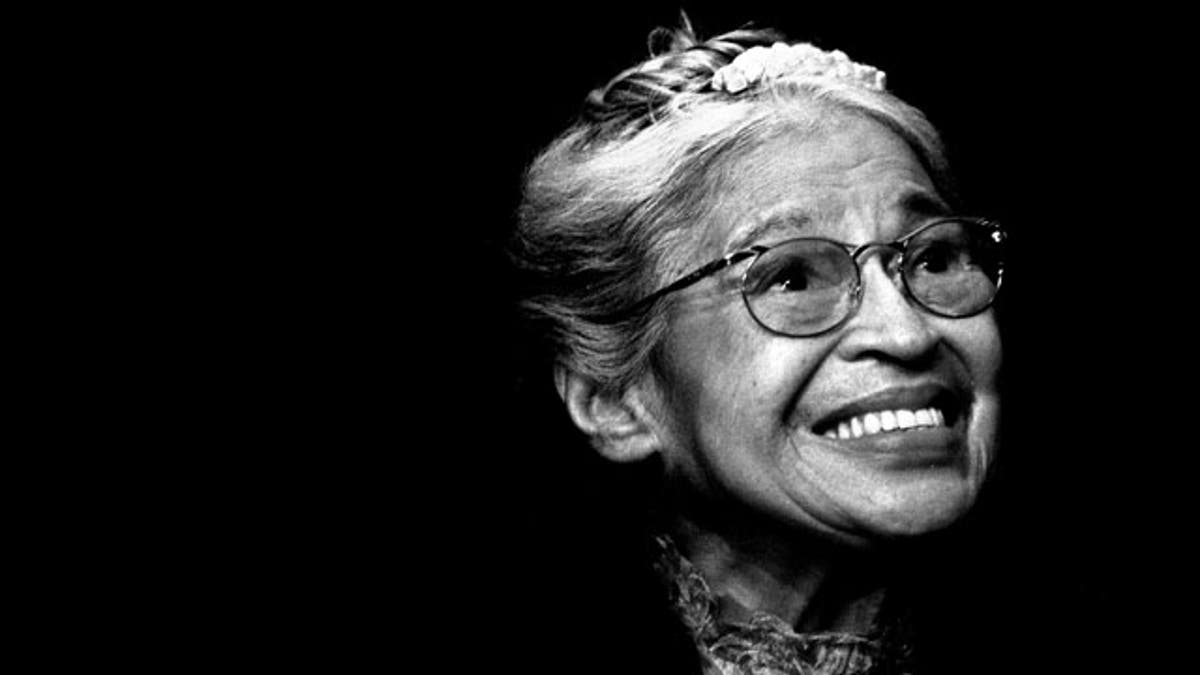
In this Nov. 28, 1999 file photo, Rosa Parks smiles during a ceremony where she received the Congressional Medal of Freedom in Detroit. A lawyer involved in a long-running dispute over the estate of civil rights pioneer Rosa Parks claims that a judge allowed two other lawyers to pile up fees that ate away about two-thirds of the estate's $372,000 cash value. (AP)
Since the terrible of events in Charlottesville earlier this month, I’ve thought again and again about the encounter I had with Rosa Parks.
The year was 1994, and—oddly enough— I found myself on a bus. As we boarded, an older African-American woman joined us. I did not recognize her at first but thought she looked very familiar. I asked someone who she was. I nearly had to pick my jaw up off the floor when I was told her name: Rosa Parks.
“Wait, THE Rosa Parks?” I asked. “THE Rosa Parks, as in the civil rights legend, Rosa Parks?”
“One and the same,” they assured me.
I was quickly struck by how strong her faith in God truly was. As a pastor, I knew at that moment where her resolve came from.
In a time like this in America, it’s important for all Americans to remind themselves of what type of country we once were.
Rosa Parks grew up in Alabama during segregation, a time when black people had separate drinking fountains and restrooms. They also were expected to sit in the back of the bus, in what was then called the “colored section,” and they even had to give up their seats to white passengers if asked.
One day, on her commute home after a long day of work, Rosa Parks was told to give up her seat. She said, “No.” She sat there in holy defiance.
They arrested her for it—arrested her! Then they convicted her of breaking Alabama’s segregation laws. But her bravery did not go unnoticed.
Her simple act of courage became a moment of national consequence, and it galvanized the Montgomery Bus Boycott, a precursor to the civil rights movement. Mrs. Parks was eventually called the “first lady of civil rights” and the “mother of the freedom movement.” She was later awarded the Congressional Gold Medal and the Presidential Medal of Freedom, the two highest honors that can be given to a civilian. Throughout her life, she received more than 43 honorary doctorates and countless other awards and recognitions.
She was an American hero who showed us a better way during a very dark time. And there I was with Mrs. Parks … on a bus.
The other Christian authors I was traveling with carried on joking with one another and talking loudly as preachers often do, while in our midst sat this soft-spoken lady who had nerves of steel to take the stand she did so many years ago on that bus in Montgomery, Alabama.
Eventually, I managed to grab a seat next to her, and we began to talk. I was quickly struck by how strong her faith in God truly was. As a pastor, I knew at that moment where her resolve came from. She wrote in her book Quiet Strength that her belief in God developed early in life.
“Every day before supper and before we went to services on Sundays my grandmother would read the Bible to me, and my grandfather would pray,” wrote Parks. “We even had devotions before going to pick cotton in the fields.”
“Prayer and the Bible,” she recalled, “became a part of my everyday thoughts and beliefs. I learned to put my trust in God and to seek Him as my strength.” Rosa Parks loved and followed Jesus Christ and no doubt that helped her to have the courage she needed when she had to have it. It has been said, “Character is not made in crisis—it is only revealed.” I believe this is exactly what happened when Mrs. Parks refused to give up her seat. We chatted for a while, and I asked her about that day in 1955, and she told me her story. It was like I crawled right inside of history for a moment, and it left an impression on my life that I have often drawn from in moments of brokenness in our American life.
Rosa has been in Heaven for a while now but the legacy she left cries out to us today. Especially in light of Charlottesville, it calls us to a moment of self-reflection for our nation. It calls us to remember the grave mistakes of our past and to renew our commitment to never allow such injustice to fester again. It calls white leaders like myself toward a kind of empathy that’s nearly impossible to experience.
In moments of conflict and division, we must stop to remember lessons from the past and be inspired by those who’ve shown us a better way. Like Rosa Parks, followers of Jesus Christ must draw upon his desire to reconcile the world unto himself and to make us “ambassadors of reconciliation.”
This last weekend, over 90,000 people of all ages and races gathered at Angel stadium in Southern California for three nights of meetings calling our nation to faith in God and love for one another.
Over 35,000 of us prayed on Sunday night for our fractured nation to be healed. And many of these people made a commitment to follow Jesus Christ.
First, we need to be reconciled to God.
Then, we can be reconciled with each other.
Politics and the press cannot heal our nation. Only faith can do that.








































